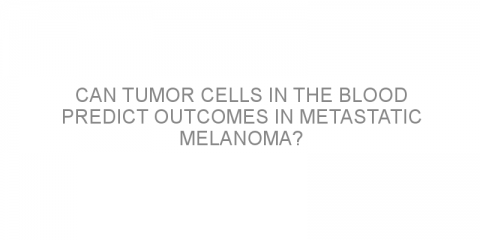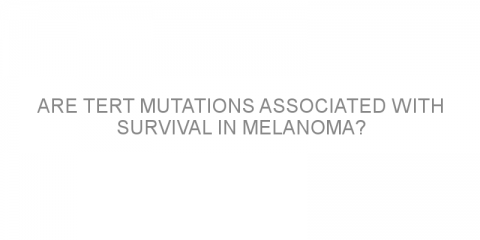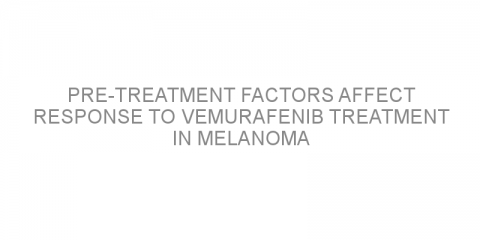In a nutshell The authors analyzed the importance of non-sentinel lymph nodes in predicting the outcomes for patients with skin melanoma. Some background In skin melanoma, sentinel lymph node (SLN) is the first lymph node (tiny, bean-shaped organ that helps fight infection) to which the cancer cells are believed to have spread...
Read MoreLocation-Skin melanoma Posts on Medivizor
Can tumor cells in the blood predict outcomes in metastatic melanoma?
In a nutshell The authors determined the benefit of measuring tumor cells in the blood for the treatment of advanced melanoma. Some background Treatment options for advanced melanoma include targeted therapy (targeting specific genes or proteins) and immunotherapy (using the body’s own immune system to fight cancer)....
Read MoreRisk of brain metastasis in head and neck melanoma
In a nutshell The authors analyzed the risk factors for developing brain metastasis in head and neck melanoma. Some background Head and neck melanomas occur in 15-20% of all skin melanomas. Head and neck melanoma often spread (metastasis) to the brain, resulting in poor survival time. The chance of developing brain metastasis in...
Read MoreSafe surgical margin and management of lymph nodes in skin melanoma
In a nutshell The objective of this study was to determine the safe surgical margin in skin melanoma (2-4 mm thickness) and provide guidelines on the management of affected adjacent lymph nodes. Some background Melanoma is a type of cancer that starts in color-producing cells of the skin. It can grow deep into the inner layers of skin and...
Read MoreAre TERT mutations associated with survival in melanoma?
In a nutshell The authors aimed to find out if the treatment outcome in melanoma patients is linked with presence and extent of mutations in a gene called TERT. Some background Melanoma is a type of cancer that starts in color-producing cells of the skin. Mutations (permanent change) in several genes are reported to be associated with melanoma;...
Read MorePembrolizumab versus ipilimumab in advanced melanoma
In a nutshell The authors aimed to evaluate survival benefits of pembrolizumab (Keytruda) compared to ipilimumab (Yervoy) in advanced melanoma. Some background In the advanced stage of melanoma (stage III/IV), cancer spreads from the skin to other parts of the body. One of the standard treatments for advanced melanoma is immunotherapy that uses...
Read MoreSkin side effects in combination therapy versus single therapy in melanoma
In a nutshell The authors aimed to compare safety of a combination therapy over a single therapy in advanced melanoma patients. Some background In the advanced stage of melanoma (stage III/IV), cancer spreads from the skin to other parts of the body. In the majority of advanced melanoma patients, BRAF genes are mutated (permanently...
Read MoreInterleukin-2 can improve survival in skin cancer patients
In a nutshell The authors aimed to determine the effect of interleukin-2 in treating in-transit skin cancer. Some background In-transit skin cancer is cancer that has progressed into the lymph nodes (sites that hold the immune cells) from the primary site of cancer. Interleukin-2 (IL-2, Proleukin, Aldesleukin) is a man-made protein...
Read MoreHow do surgery margins affect melanoma recurrence?
In a nutshell The authors aimed to determine whether reducing surgery margins would increase cancer recurrence in melanoma patients. Some background Wide local excision is a common form of treatment in patients with melanoma. It involves surgically removing the cancerous tissue and a layer of healthy tissue surrounding the melanoma. Margins are...
Read MoreTafinlar vs DTIC in metastatic melanoma; which has better quality-of-life outcomes?
In a nutshell The authors aimed to determine the quality-of-life benefits for metastatic melanoma patients treated with dabrafenib compared to dacarbazine. Some background Metastatic melanoma is melanoma that has spread out to other parts of the body from the primary tumor site. Dabrafenib (Tafinlar) and dacarbazine (DTIC) are drugs used to treat...
Read MoreCombination therapy is more effective in treating metastatic melanoma
In a nutshell The authors aimed to determine the effects of combination therapy compared to single therapy in melanoma patients with BRAF mutations. Some background Melanoma can arise as a result of family genetics where mutations in specific genes such as BRAF genes (controls the functions needed for cell growth) can be passed on to family...
Read MorePre-treatment factors affect response to vemurafenib treatment in melanoma
In a nutshell The authors aimed to determine the effect of pre-treatment factors in melanoma patient response and survival when treated with vemurafenib. Some background Vemurafenib (Zelboraf) is a drug treatment used in advanced melanoma. It targets and kills melanoma cancer cells in patients that have BRAF V600 melanoma mutations. Methods...
Read More











